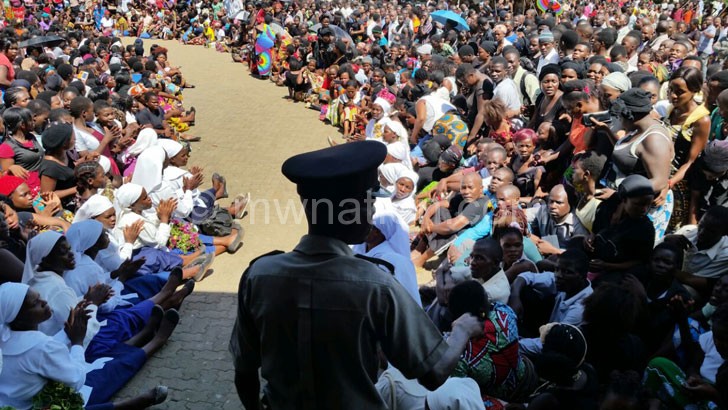Lessons from Grace Chinga’s death
Gospel songbird Grace Chinga—born on June 28 1978 and died on March 16 2016—lived the life of a commoner. But events surrounding her death revealed some serious lessons such as weak policies safeguarding artists, unceremonious conduct of officials and, remarkably, the influence of her music and the power of the arts in general.
Multitudes gathered at her mother’s house in Chilobwe Township in Blantyre, at Robin’s Park (where her memorial ceremony was conducted) and even more went to HHI cemetery to pay their last respect to her.

Her boundless talent, which was manifested through her commanding voice and influential songs such as Kolona and Wayalula, connected her with people from across the country and even beyond borders.
Legacy under scrutiny
The mammoth crowd that attended her funeral and escorted her to her final resting place—causing traffic jams in the city of Blantyre in the process—belied her popularity while alive and put the life of a celebrity under the microscope. Where were all these people when Chinga was alive? Are celebrities loved more when they are dead? Will the remaining celebrities be accorded a similar dignity when they are gone? And what kind of career or lifestyle should the remaining celebrities or musicians forge to deserve Chinga’s legacy?
Apart from the scores of people, including top government officials and celebrities that attended Chinga’s funeral, the hearse carrying her remains, was guarded by heavily-armed police officers all the way to the graveyard. Where were these law enforcers when Chinga was singlehandedly fighting piracy? Was her death more important to deserve heavy protection than her music when she was alive?
Princess Chitsulo, singer of the hit, Ndidzaimba Nyimbo, lamented on her Facebook page, on Grace’s passing in particular and the celebrity life in general: “Grace Chinga, if celebrity life is about what I saw on your death, I am afraid. Our lives are not for us only. No privacy at all. It’s for the public until the last destination.”
Some of the high profile people who recognised the role of Chinga and sent their condolences to the family included President Peter Mutharika, former president Joyce Banda, Malawi Congress Party (MCP) president and ministers and Members of Parlirment (MPs).
In her remarks, Minister of Sports and Culture Grace Chiumia described Chinga as a change agent. Indeed, at long last she was called a change agent—an apt description she would have loved to be given when she was alive.
“It’s very unfortunate that artists are honoured and recognised when they are dead. This does not reflect well on the role that they play in the country. They deserve to be honoured and protected when they are alive,” says Reverend Chiwemmwe Mhango, president of the Musicians Union of Malawi.
He says there is a need for attitude change towards artists in the country if they are to contribute to the development of the country.
He cites artists’ participation in issues of national importance such as election and political campaigns, civic education and general music performance as some of the direct contributions to the society which help to shape people’s attitudes and improve their psychological well-being and engagement in issues of national importance.
Chinga was a singer who had been around for over two decades yet she was still struggling to find her financial feet through her music. Not because she was not producing good music but because of chaos which has been created in the music industry and render artists hopeless.
To make matters worse, pirates have pounced on her unreleased album.
“It is an open secret that musicians are no longer making a fortune from the sales of their music because people are just pirating their music. Worse still, Malawi’s copyright laws are weak which sees the courts imposing pity fines on pirates which do not even deter the malpractice,” says gospel musician Lloyd Phiri.
Malawi is yet to approve the cultural policy and enact the new Copyright Bill which is expected to benefit the arts and culture industries.
“Today artists are dying paupers because the environment is not enabling for growth. There are no arts programmes aimed at building their economic standing or improve the market of their art works, let alone effective policies to protect the works. Yet we have policymakers in the country,” said veteran musician Patrick Simakweli.
Asked about their stand on protecting the copyright works, including pirated music of Chinga, Copyright Society of Malawi (Cosoma) says it is hard to control it because the album was not officially released on the market.
“I talked with Chinga’s son to register the music with us so that we have a legal backing that whatever we would find on the market is illegal. We need to have the authentic product first in order to effect an operation because that acts as our legal base,” said Cosoma’s senior licensing officer Rosario Kamanga.
Kamanga warns artists against sharing their work or selling without holograms which validate a product.
“There are times when we go on the market and find that the said original copies are not because they do not bear official emblems of Cosoma.
“Artists, especially musicians, should cultivate a culture of registering with Cosoma before taking their products on the market,” he said.





